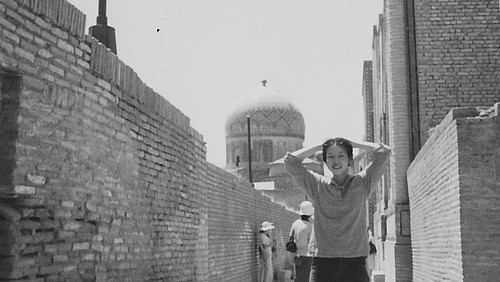Kidlat Tahimik counts as one of the most important and influential filmmakers from the Philippines. Similar to his aforementioned colleagues his works deal with the difficult and problematic legacy of colonialism as well as the process of adapting to modernity, in particular, the rise of capitalism and commercialism. His first, and arguably his most famous feature “Perfumed Nightmare” already set the groundwork for these themes, earning him not only critical praise but also international acclaim, such as awards at the Berlin Film Festival. However, in the light of recent developments such as gentrification, “Perfumed Nightmare” has become more relevant than ever, as its satirical approach highlights the pitfalls behind a rapidly growing economy and a form of globalization growing detached from the cultural roots of a nation.
“Perfumed Nightmare” is screening at Vesoul International Film Festival of Asian Cinema

Throughout the feature, Tahimik follows a semi-documentary approach telling the story of his life and eventual disillusionment, starting with his childhood and his dream of becoming an astronaut. Considering his father was a famous engineer in his hometown, building the first bamboo bridge, which was later demolished by the colonial authorities, he tells his viewer about his heartfelt admiration for people with a vision, more specifically German engineer Wernher von Braun whose research set the foundation for NASA's space program. During his days as a Jeepney driver in his hometown, Tahimik dreams of participating in the space program, becoming the first Filipino astronaut, until one day he gets one step closer to achieving it upon meeting a US businessman.
Impressed by Tahimik's dreams, his personality and his humor, the American convince the Jeepney-driver to accompany him on his trips, first to France and eventually to the USA, where he will become an integral part in the businessman's empire. Seeing this as a once-in-a-lifetime opportunity, Tahimik agrees and travels to Paris, where he, along with his duties as a Jeepney-driver, is also responsible for maintaining the various gumball-machines owned by the American. However, as time goes by and he encounters a variety of Parisian shopowners and the stories about how bigger companies are destroying their livelihood, Tahimik starts to think whether his dream might actually become his worst nightmare.
According to his own account, Tahimik never actively pursued a career in filmmaking, which is actually an opportunity that came purely by chance. While “Perfumed Nightmare” indeed has a distinct air of amateurism about it, especially due to home video-aesthetics, there is also no doubt this early work proves he understood issues such as framing, visual metaphors and most importantly irony, both literary and visually. Right from the very first moments of the feature you notice the way Tahimik's camera tells a story of a man's development through minor details, such as a boy, a youth and finally a grown man (Tahimik himself) pulling a toy car and later on an automobile across a concrete bridge. Immediately, his character is presented as a dreamer, a man of visions and ambitions for his life, a man willing to cross bridges, as he says himself, real ones and those standing for progress.
Eventually, as we follow the story about Tahimik's job, his costumers and the odd characters living in his village, the director adds more layers, especially with regard to the relationship of the community, technology and progress. This concept is mirrored when the main character later talks to shop owners, vendors and other people in Europe, showing that, even though there might be cultural differences, the development remains the same, which is the superiority of franchise culture or rather the “McDonaldization” of culture. While the remains of previous cultures, those of the colonizers, were eventually assimilated, such as the Jeepneys which are made of spare parts from old army vehicles, this new form of colonization is global, for more aggressive and affects everyone, from the capitals of Europe to small hamlets in the Philippines.
Despite the seriousness of its themes, aspects such as the design of the central character, his outlook on life and the structure of the story, “Perfumed Nightmare” is a thoughtful, but not pessimistic feature. Supported by the narration of the main character, Tahimik follows the principle of the development novel (or rather feature), or “Entwicklungsroman”, with his protagonist going through various changes, stages of disappointment, but also constructive contemplation over what he has observed.
In the end, “Perfumed Nightmare”, in spite of its often grim and dark undertones, becomes an uplifting tale about the human power of resistance and the strength in humor. Kidlat Tahimik has managed to direct one of the most relevant features on topics like globalization and capitalism, their world-wide consequences and hoe they have changed the lives of many.















